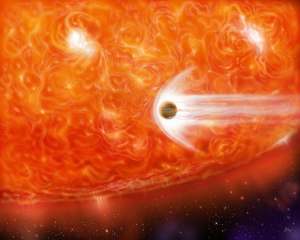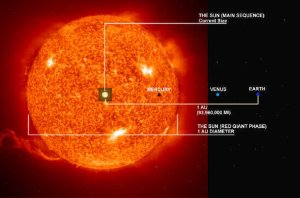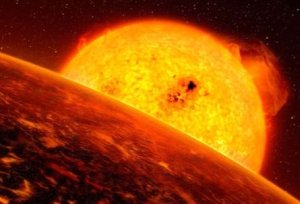
A Red-Giant that Eats Worlds:

Despite all of the universe’s beauty and magnificence, it can be a grim and depressing place. With this in mind, astronomers have caught a glimpse of the future of our solar system. They have spotted evidence of a planet’s destruction…in addition to evidence of a planet in the process of being devoured–both caused by an aging star entering its red-giant phase. This is the same fate scientists foresee for the inner planets of our own solar system. Fortunately, we still have about five-billion years.
When scientists first observed the star (called BD+48 740) their analysis showed an unusually high level of lithium. Lithium is a rare element; most of it was created during the big bang. And it can only be in created through a very limited number of extreme methods. This is where things get a little exciting.

The planet found in orbit around BD+48 740 is in a highly elliptical orbit, the kind of orbit a planet can only obtain with the aid of another planet. Eva Villaver, from the Universidad Autonoma de Madrid (Spain) explains, “Catching a planet in the act of being devoured by a star is an almost improbable feat to accomplish because of the comparative swiftness of the process, but the occurrence of such a collision can be deduced from the way it affects the stellar chemistry.”

So, what exactly is going on here? We believe there were at least two planets in orbit around BD+48 740. As the star expanded, entering the red giant phase, the innermost planet was consumed by the star, slamming into the solar surface and, in so doing, creating the unusually high concentrations of lithium. The energy from this collision helped to push the planet we now observe into a more elliptical orbit, sparing it for the time being.
So, using the power of science, we go from some red giant in a random area of the sky… to a completely unique situation in which we see evidence of the epic destruction of one planet as it saves another from being consumed by their once friendly star… all because of lithium and an elliptical orbit.
Isn’t science cool?